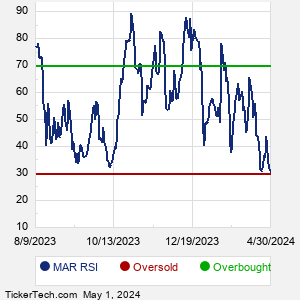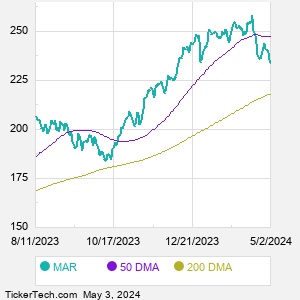Marriott International is an operator, franchisor, and licensor of hotel, residential, and timeshare properties under various brand names at different price and service points. Co. has two operating segments: U.S and Canada and International. Co.'s Luxury hotel brands include JW Marriott, The Ritz-Carlton, and St. Regis. Co.'s Premium hotel brands include Marriott Hotels, Sheraton, Delta Hotels, Marriott Executive Apartments, and Marriott Vacation Club. Co.'s Select hotel brands include Courtyard, Residence Inn, Fairfield, SpringHill Suites, Four Points, TownePlace Suites, Protea Hotels, Aloft Hotels, AC Hotels by Marriott, Element Hotels, and Moxy Hotels.
When researching a stock like Marriott International, many investors are the most familiar with Fundamental Analysis — looking at a company's balance sheet, earnings, revenues, and what's happening in that company's underlying business. Investors who use Fundamental Analysis to identify good stocks to buy or sell can also benefit from MAR Technical Analysis to help find a good entry or exit point. Technical Analysis is blind to the fundamentals and looks only at the trading data for MAR stock — the real life supply and demand for the stock over time — and examines that data in different ways. One of these ways is called the Relative Strength Index, or RSI. This popular indicator, originally developed in the 1970's by J. Welles Wilder, looks at a 14-day moving average of a stock's gains on its up days, versus its losses on its down days. The resulting MAR RSI is a value that measures momentum, oscillating between "oversold" and "overbought" on a scale of zero to 100. A reading below 30 is viewed to be oversold, which a bullish investor could look to as a sign that the selling is in the process of exhausting itself, and look for entry point opportunities. A reading above 70 is viewed to be overbought, which could indicate that a rally in progress is starting to get crowded with buyers. If the rally has been a long one, that could be a sign that a pullback is overdue. |



